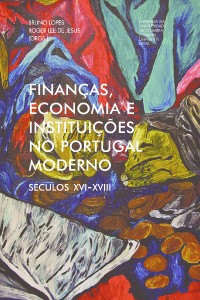Please use this identifier to cite or link to this item:
https://hdl.handle.net/10316.2/47063| Title: | Instituições e auto-organização em redes comerciais e financeiras no espaço Ibérico: (segunda metade do século XVI – 1609) | Other Titles: | Institutions and self-organization in trading and financial networks in the Iberian space: (second half of the sixteenth century - 1609) | Authors: | Ribeiro, Ana Sofia | Keywords: | Formal institutions;norms;Iberian trading networks;self-organization;Instituições formais;normas;redes comerciais ibéricas;auto-organização | Issue Date: | 2019 | Publisher: | Imprensa da Universidade de Coimbra | Journal: | http://hdl.handle.net/10316.2/47058 | Abstract: | The current historiography has underlined the role of the emergence and
strength of institutions as a means to successful business partnerships among early modern
merchants devoted to long-distance trade, under the inspiration of the New Institutionalist
theory. Ogilvie, Gelderblom or Grafe have shown how institutions like north-European
monopolist companies, nations colonies or national/regional guilds sustained the business
agreements between trading agents, as did the development of a legalist, contractual and
notarial culture. Simultaneously, literature argues that the use of informal institutions would
only be possible between partners belonging to a strong close knit community, sharing
ethnical or cultural backgrounds (Greif, Studnicki-Gizbert, Aslanian).
This chapter analyzes the role of formal and informal institutions in the establishment
and sustenance of trading partnerships in the second half of the 16th century and first years
of the 17th century, using two distinct Iberian case studies. First, it seeks to understand the
appeal to the preexisting formal institutions of Iberian merchants, as their reactions to those
institutions created in the period. In a second moment, it reveals the mechanisms used to
prevent rupture and cheating in business partnerships (namely, norms), as well as policing
strategies, using data from notarial records and correspondence. Finally the chapter argues
this problem in the light of network theory and cooperation studies which help to understand
how informal institutions emerge, namely through self-organization. Nas últimas décadas, a historiografia, na senda da tradição da Nova Economia Institucionalista, tem salientado que a cooperação e a associação bem-sucedida entre mercadores dedicados ao comércio de longa distância se devem ao surgimento e fortalecimento de instituições, sobretudo mais formais e legalistas. Autores como Ogilvie, Gelderblom ou Grafe têm apontado como algumas instituições, por exemplo as companhias monopolistas (norte-europeias, sobretudo), consulados e outras nações ou colónias comerciais nacionais ou o desenvolvimento e alargamento da cultura jurídica, contratual e notarial da Época Moderna, sustentaram o entendimento entre agentes comerciais. Autores que versam sobre instituições informais sublinham que a confiança entre parceiros só seria possível de manter dentro de comunidades fechadas, que partilhassem uma ascendência ou origem cultural comum (Greif, Studnicki-Gizbert, Aslanian). Este capítulo, a partir de dois estudos de caso ibéricos, analisa o papel das instituições formais e informais no estabelecimento e manutenção da cooperação em parcerias comerciais portuguesas e espanholas, na segunda metade do século XVI e primeiros anos do século XVII. Procura perceber como foi o recurso destes homens às instituições formais pré-existentes, quais as suas reações àquelas que se procuraram criar nesta época. Salienta, num segundo momento, a partir de dados recolhidos em cartórios notariais e correspondência comercial, os mecanismos utilizados para o sustentáculo das parcerias comerciais (normas informais), tal como os meios de policiamento. Finalmente, discute este problema à luz de teorias explicativas da teoria de redes e cooperação, que poderão ajudar a compreender como emergem estas instituições informais, nomeadamente a partir do conceito de auto-organização. |
URI: | https://hdl.handle.net/10316.2/47063 | ISBN: | 978-989-26-1638-4 (PDF) 978-989-26-1637-7 |
DOI: | 10.14195/978-989-26-1638-4_5 | Rights: | open access |
| Appears in Collections: | Finanças, economias e instituições no Portugal moderno: séculos XVI-XVIII |
Files in This Item:
| File | Description | Size | Format | |
|---|---|---|---|---|
| instituicoes_e_auto-organizacao_em_redes_comerciais.pdf | 3.41 MB | Adobe PDF |  |
Items in DSpace are protected by copyright, with all rights reserved, unless otherwise indicated.
